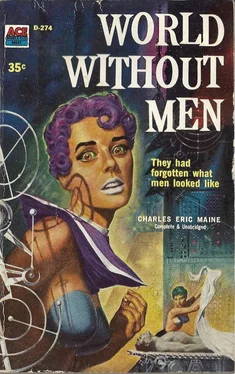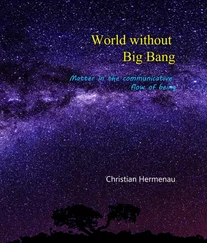Charles Maine - World Without Men
Здесь есть возможность читать онлайн «Charles Maine - World Without Men» весь текст электронной книги совершенно бесплатно (целиком полную версию без сокращений). В некоторых случаях можно слушать аудио, скачать через торрент в формате fb2 и присутствует краткое содержание. Город: New York, Год выпуска: 2013, Издательство: Ace Books, Жанр: Фантастика и фэнтези, на английском языке. Описание произведения, (предисловие) а так же отзывы посетителей доступны на портале библиотеки ЛибКат.
- Название:World Without Men
- Автор:
- Издательство:Ace Books
- Жанр:
- Год:2013
- Город:New York
- ISBN:нет данных
- Рейтинг книги:4 / 5. Голосов: 1
-
Избранное:Добавить в избранное
- Отзывы:
-
Ваша оценка:
- 80
- 1
- 2
- 3
- 4
- 5
World Without Men: краткое содержание, описание и аннотация
Предлагаем к чтению аннотацию, описание, краткое содержание или предисловие (зависит от того, что написал сам автор книги «World Without Men»). Если вы не нашли необходимую информацию о книге — напишите в комментариях, мы постараемся отыскать её.
World Without Men — читать онлайн бесплатно полную книгу (весь текст) целиком
Ниже представлен текст книги, разбитый по страницам. Система сохранения места последней прочитанной страницы, позволяет с удобством читать онлайн бесплатно книгу «World Without Men», без необходимости каждый раз заново искать на чём Вы остановились. Поставьте закладку, и сможете в любой момент перейти на страницу, на которой закончили чтение.
Интервал:
Закладка:
Cordelia blinked and opened her mouth as if about to speak, but said nothing. The Mistress of Applied Cytology smiled shallowly.
“This is not the first time we have had promising indications, of course. On many occasions cytologists have succeeded in creating a forty-seven chromosome embryo which divided and grew — for a short time. Naturally we are most anxious to avoid the spread of rumour and false information. Therefore we take stringent precautions.”
“I understand,” Cordelia murmured.
“We have a special laboratory reserved for what we define as alpha projects. What is more, we have a special staff of skilled and trained cytologists to take over such projects and develop them under carefully controlled conditions.”
“You mean, I am to be relieved of my part in test four-six-five?”
“Not at all, Cordelia. You will work in liaison with our alpha scientists. After all, you may be able to help them in many ways, initially.”
“And then…?”
“Well, if the project is successful, if the embryo survives and grows, then the alpha scientists will probably take over completely. You see, Cordelia, the development of a live male embryo is not purely an abstract scientific experiment. There are certain important social ramifications. There have been no live males in the world for some five thousand years, and an experiment like this, if it succeeds, must be considered from very many angles. It moves from the field of science into that of politics.”
Cordelia eyed her superior thoughtfully, striving to read beyond the glassy inscrutable surface of the other woman’s expressionless eyes. There was no sense of psychic contact; never had there been between people for as long as she could remember, except when the parthenogentic adaptation syndrome produced emotional affinity that resolved itself in physical eroticism. A new and unwelcome idea invaded her brain. Were robots, she and I, Cordelia thought. We’re integers in some vast, impersonal social equation. We’re not even individuals because we do not have the right of individual action any more. We are part of the mechanism, cells in the superior planetary body of integrated womankind, and our brain is an electronic brain and our conduct is controlled and predicted by a myriad electronic computing units.
The feeling came and went, phantom-like. The Mistress condensed into solid humanity again and her hard fleshy face became earthy and workaday. In a hundred years it would be a sallow, gleaming skull.
“Return to your laboratory,” said the Mistress. “Meanwhile I shall confer with the Ministry. In the course of a few hours I shall communicate with you and give you detailed instructions.”
“And my assistants — what shall I tell them?”
The Mistress moved her lips into the shape of a grin. “By the time you reach your laboratory they will already have gone. You will never see them again.”
The new laboratory was a subsection of the secret research centre of the Ministry’s Department of Applied Cytology. It was located more than a hundred feet below the ground, directly beneath the tall skyscraper that housed the immense staff of the Ministry of Biophysical Research. Cordelia had never even suspected the existence of the place, which was not surprising in view of the fantastic security precautions. She found that she was obliged to live underground, in a small apartment adjacent to the laboratory. Ten other research cytologists lived underground too. For three months she worked and slept beyond sight of sky or sunlight, breathing chemically conditioned air, living in perpetual artificial light, working at the gleaming chrome and plastic benches or the shining incubators, sleeping naked under the ultraviolet strip lamps that kept her body bronzed and healthy. She worked under orders, for she was no longer a responsible scientist in her own right; she was part of a team, and the other cytologists were women who had been specially selected for work of high security value. Security, it seemed, mattered more than scientific ability.
Test four-six-five was not the only experiment in progress. She was astonished to find that there were seventeen male embryos in the thermostatically controlled incubators of the laboratory: the one she had originated, and sixteen others. And one by one they died. It was one thing to create a male embryo, but quite another to secure its survival.
Her colleagues, she soon knew, were experienced in synthetic embryology. They knew all the answers, while she was still in the phase of asking questions. The embryos died, and they knew exactly why they had died, but they could do nothing about it. But embryo four-six-five, incredibly, did not die. It was a matter of indefinables, of some subtlety in the exact mechanism of surgical micro-cytology, of some precise factor in the artificial synthesis of a male gamete. It was some unpredictable phenomenon in advanced biochemistry, in discrete cell physiology. It was a phenomenon that might not be reproduced again for a decade, or a hundred years, or ever again. All in all, a miracle, but a miracle of patiently applied science over a long period.
The embryo grew and grew, and began to differentiate. Limbs began to appear, and a head and a beating heart. The artificial placenta supplied oxygenated blood to the tiny living creature, and the saline solution in which it was immersed was maintained precisely at a temperature of ninety-eight point four degrees Fahrenheit.
Gestation was rapid, accelerated by carefully conceived electronic control, by automation applied to human embryology. Cordelia’s estimate of ten weeks proved to be a little on the pessimistic side. At the end of eight weeks the embryo was already a male child weighing four pounds and more, still attached to the artificial placenta, but moving its limbs with aggressive energy. It became apparent that the child would, within the fortnight, be ready for independent existence, ready for severing from the placenta and removal from the saline solution, ready to learn to breath and cry and suckle on electronically fed teats. Or, as Cordelia recognized with a faint feeling of revulsion which had its origin in compulsory fertility and parthenogenesis, ready for birth.
Her own interest in the male child grew steadily from day to day. This was something quite different from the normal routine procedure of birth. Females were being produced on what might almost be regarded as an assembly line basis every hour of the day, but here was a male, growing and developing under experimental laboratory conditions. A creature unique in time and space, unique, at any rate, for five millennia.
Sometimes she fell to speculating about the future of the child, her child, in the incubator. What role could a male fulfil in a monosexual society that had adapted itself to its own peculiar mode of existence and survival for longer than anyone could remember? Was there any point or purpose in allowing the child to survive? And supposing there were more male children, supposing the child, on attaining maturity, would be able to reproduce its own sex in defiance of the natural inhibition that had operated for so many centuries: What then? Could society turn the clock back and resume heterosexual living? Could women tolerate reversion to the primitive in matters of human propagation? Induced parthenogenesis was neater, cleaner and so precise. Devoid of emotional contamination, and pure in that it was a function on the level of abstract duty, it was impregnation by the unseen and the unfelt. Radiation was surely the ultimate in reproductive technique, and no modern woman could contemplate without horror any kind of crude physical fertilization by a creature that had been obsolete for thousands of years. It was unimaginable.
And yet there was something appealing about the child in the incubator, something that occasionally caught the heart, like an injection of adrenalin, and produced an indescribable writhing of the fundamental emotions. And Cordelia was conscious of a very special feeling of proprietorship, for it was she who had performed the original micro-cytological operation that had injected the breath of life into the pink and wrinkled midget inside the glass case. The child was hers, as surely as if she personally had given birth to it in a State fertility centre.
Читать дальшеИнтервал:
Закладка:
Похожие книги на «World Without Men»
Представляем Вашему вниманию похожие книги на «World Without Men» списком для выбора. Мы отобрали схожую по названию и смыслу литературу в надежде предоставить читателям больше вариантов отыскать новые, интересные, ещё непрочитанные произведения.
Обсуждение, отзывы о книге «World Without Men» и просто собственные мнения читателей. Оставьте ваши комментарии, напишите, что Вы думаете о произведении, его смысле или главных героях. Укажите что конкретно понравилось, а что нет, и почему Вы так считаете.












